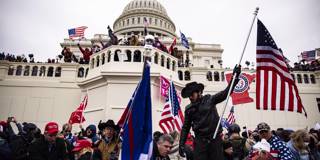OnPoint Subscriber Exclusive
The Big Picture brings together a range of PS commentaries to give readers a comprehensive understanding of topics in the news – and the deeper issues driving the news. The Big Question features concise contributor analysis and predictions on timely topics.

Trump’s Failed Putsch
Amid chaotic scenes at the US Capitol on January 6, senior Republicans, in a belated attempt to salvage their reputations, distanced themselves from President Donald Trump’s persistent refusal to accept the result of the presidential election and commit to a peaceful transfer of power. But the raging, conspiracy-mongering hysteria of Trump loyalists, and the fact that more than 74 million Americans voted for him in 2020, raise grave questions about the state of US society, and whether Trumpism is really a spent political force.
In this Big Picture, The New School’s Nina L. Khrushcheva sees the failed Trump putsch and profaning of the Capitol as a direct and predictable result of four years of presidential contempt for America’s laws and Constitution. And Columbia University’s Jeffrey D. Sachs says that Trump’s incitement of his supporters was merely the latest chapter in America’s long history of mob violence stoked by white elites.
Princeton’s Jan-Werner Mueller calls for Trump to be impeached, removed from office, and banned from politics for life. And Ian Buruma argues that, without the messianic Trump at the helm, Republicans may well face a period of vicious infighting that could conceivably tear their party apart.
But beyond Trump lies Trumpism. Yale University’s Koichi Hamada thinks the best way to mitigate the risk of an authoritarian comeback is for Republicans and Democrats to close the cognitive gap that is distorting US political discourse, and return Americans to a shared reality. But Yasheng Huang of the MIT Sloan School of Management thinks the right-wing authoritarian disposition of Trump’s slavishly loyal and ethnically diverse electoral base means that widespread disdain for rules and norms is unlikely to disappear anytime soon.
In fact, Harvard University’s Martha Minow warns that America’s political turmoil could still deepen, particularly if Trumpian attacks on the rule of law and the mobilization of partisan antipathy continue to escalate even after he leaves office. The big question now, therefore, says J. Bradford DeLong of the University of California, Berkeley, is what the defeated insurrectionists will do for the next four years.